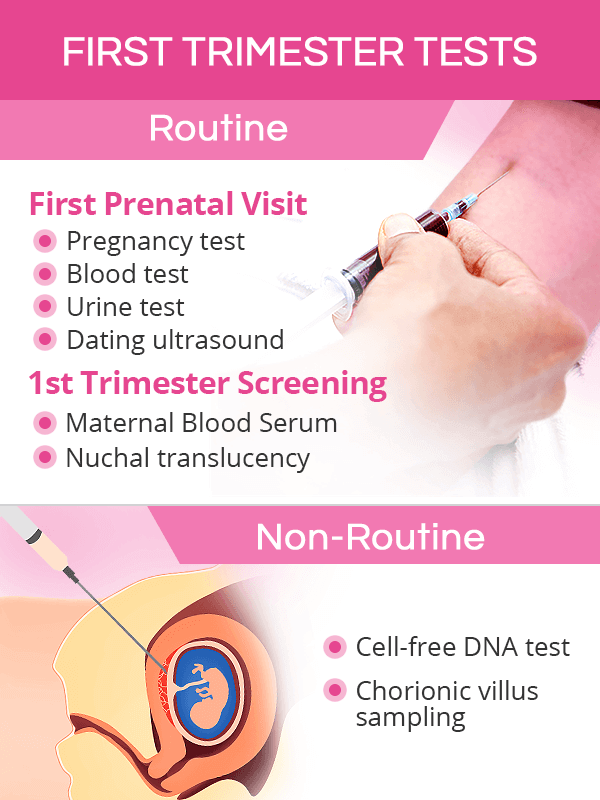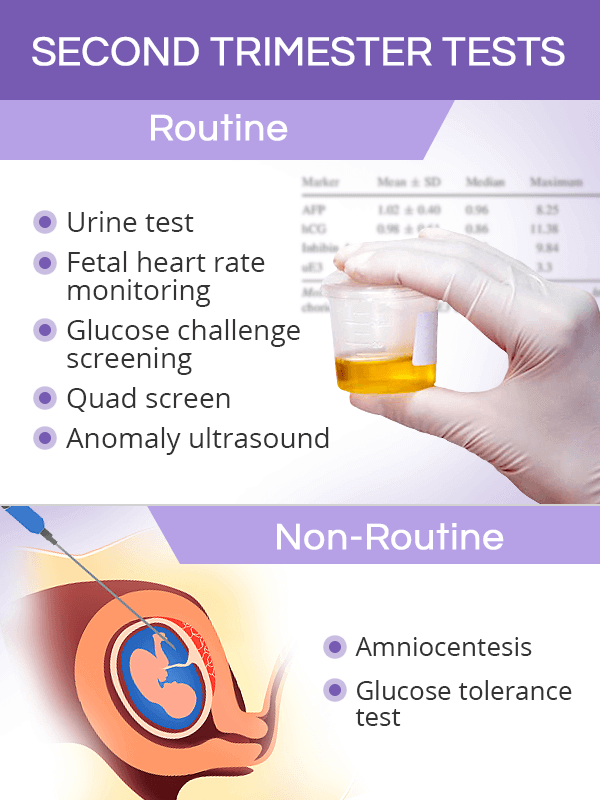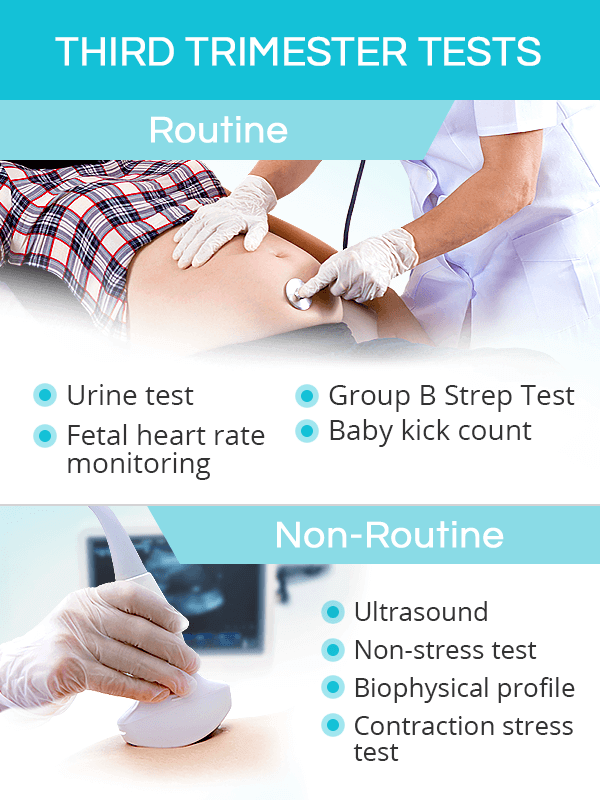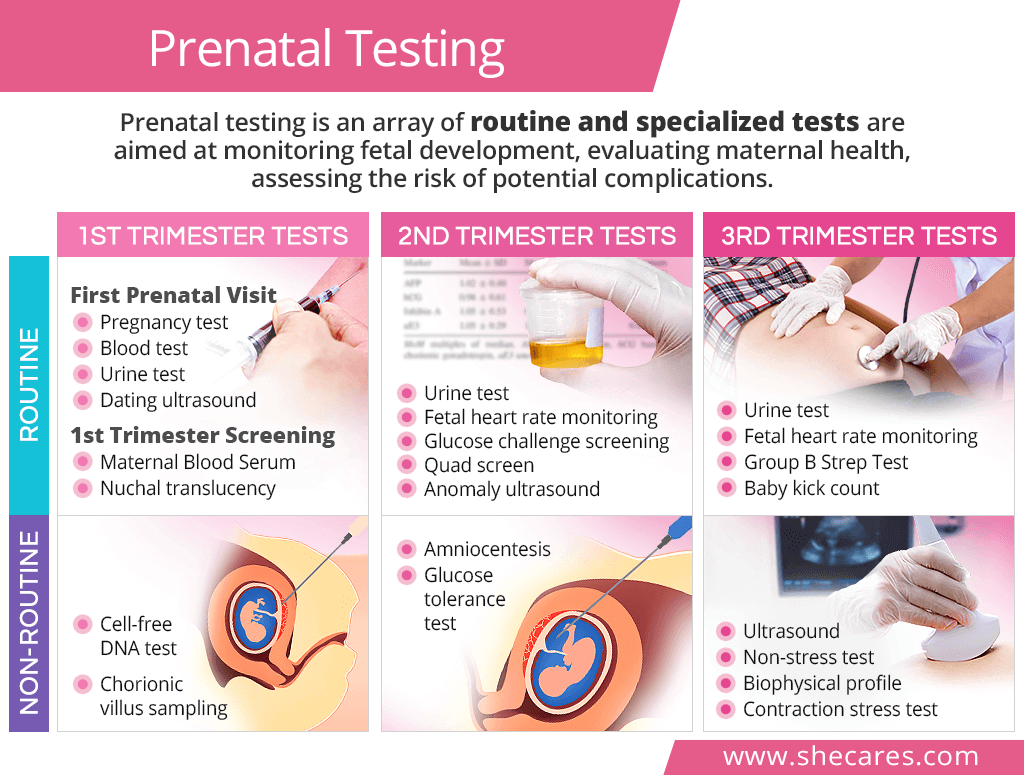First Trimester Tests (Weeks 1-13)
The aim of prenatal testing during the first trimester is to confirm pregnancy, assess its viability, evaluate mother's health, and monitor early fetal development.
First Prenatal Visit Tests

Pregnancy test (7-10 days after a missed period). The very first prenatal test a woman takes at home or a clinic is the pregnancy test itself, which detects human chorionic gonadotropin (hCG) in urine or blood.
Blood test (8 weeks). Initial prenatal blood test checks for maternal blood type, Rh factor, immunity to some infectious diseases, sexually transmitted diseases (STDs), and overall health status and deficiencies.
Urine test (8 weeks and every visit). Most commonly, a woman's urine will be tested at every prenatal visit as it can detect signs of diabetes, preeclampsia, and urinary tract infections (UTIs).
Dating ultrasound (8 weeks). Though it is not always done during the first prenatal visit, an ultrasound in the 8th week can be used to confirm the number of fetuses, detect baby's heartbeat, and rule out an ectopic pregnancy. It is often called the “dating ultrasound” as it can also help estimate baby due date.
Routine First Trimester Screening
Maternal blood serum (11-14 weeks). A first part of the “first trimester screening,” it is a blood test that checks the levels of pregnancy-associated hormones to evaluate the risk for Down syndrome and other birth defects.
Nuchal translucency screening (11-14 weeks). Along with maternal blood serum, it is non-invasive prenatal testing via an ultrasound that measures the thickness of the fetal neck to assess chromosomal and cardiovascular abnormalities. Nuchal translucency can also estimate due date if a dating ultrasound was not done at 8 weeks.
Non-Routine First Trimester Tests
Non-invasive prenatal testing (NIPT; 10 weeks). Also called a cell-free DNA test, it screens mother's blood for evidence of chromosomal changes in the fetus. It is mostly recommended for women with abnormal first trimester screening results and those at high risk for chromosomal problems due to their age, family history, etc.
Chorionic villus sampling (CVS; 10-13 weeks). It is an invasive prenatal genetic testing that examines placental tissue to diagnose birth defects, like Down syndrome, or genetic disorders, like cystic fibrosis. CVS is performed based on abnormal first trimester screening results or risk factors.
Second Trimester Tests (Weeks 14-27)
The focus of prenatal testing in the second trimester is ruling out birth defects, catching signs of complications, and continuing monitoring fetal development.
Routine Second Trimester Tests

Urine test (every visit). Besides signs of infections, a urine test in the second trimester tests for sugar levels to rule out gestational diabetes, which might develop between the 25th and 28th week of pregnancy.
Fetal heart rate monitoring (every visit). Aimed at checking the baby's heartbeat, fetal monitoring test can be done with a fetoscope or an electronic tool called a Doppler.
Glucose challenge screening (24-28 weeks). Done from a blood sample, glucose challenge test also evaluates the risk for gestational diabetes.
Maternal serum screen (15-20 weeks). Also called quad screen, multiple marker screen, or triple test, it is a blood test used to determine the risk of the baby having chromosomal changes or neural tube defects, like spina bifida or Down syndrome.
Anomaly ultrasound (18-20 weeks). Also referred to as the morphology scan, it is a pregnancy ultrasound that thoroughly examines the baby's body for developmental anomalies. It can also serve as a gender scan.
Non-Routine Second Trimester Tests
Amniocentesis (15-20 weeks). It is invasive prenatal testing consisting of examining the amniotic fluid for developmental anomalies in a baby. Amniocentesis is mainly done when first and second trimester maternal serum screen results are abnormal.
Glucose tolerance test (24-28 weeks). It is a diagnostic test done to diagnose gestational diabetes after obtaining abnormal results from the glucose challenge screening.
Third Trimester Tests (Weeks 28-40)
As a woman approaches her due date, prenatal testing will concentrate on monitoring the baby's growth and mother's health and catching the signs of potential third trimester complications:
Routine Third Trimester Screening

Urine test (every visit). Routine urine tests continue to screen for the presence of sugar, protein, or bacteria in the urine as signs of complications.
Fetal heart rate monitoring. Assessing the baby's heartbeat in the third trimester is an important tool for catching the signs of fetal distress early on.
Group B streptococcus test (35-37 weeks). Closer to childbirth, a vaginal and rectal swab can detect bacteria that - although not dangerous to women's health - can cause infectious in newborns during labor and delivery.
It is worth mentioning that women in the third trimester are encouraged to do a baby kick count, a simple at-home test that helps monitor baby's well-being by keeping track of his or her movement throughout the day.
Non-Routine Third Trimester Tests
Ultrasound (32-36 weeks). Although not routine in the third trimester, an ultrasound can be used to check on the developing baby, his or her position, the placenta, and the amniotic fluid, especially if there are concerns.
Non-stress test (NST, after 28 weeks). NST can be used to evaluate the baby's heartbeat in overdue or high risk pregnancies.
Biophysical profile (BPP; after 32 weeks). It is a combination of an ultrasound and a non-stress test to evaluate baby's respiration, heart rate, muscle tone, movement, and amniotic fluid.
Contraction stress test (34 weeks or later). It is done when ultrasound or BPP results are abnormal to determine if the baby's heart can withstand labor contractions.
Key Takeaways
From the very first day a woman realizes she is pregnant until the delivery, her and her baby's health is closely monitored via numerous routine and specialized prenatal testing. Besides monitoring a woman's weight, blood pressure, and fundal height, she will be given various tests are aimed at assessing baby's growth, evaluating her well-being, and catching complications early on. Routine prenatal tests are offered to all women throughout all pregnancy stages and include an array of blood and urine tests as well as ultrasounds. Non-routine tests are generally recommended to women with high-risk pregnancies, certain risks factors, or after abnormal routine tests results. These include prenatal tests like amniocentesis, non-stress test, or additional ultrasounds. In all cases, the mother has full deciding power over which tests to undergo.
Sources
- American College of Obstetrics and Gynecology. (2017). Prenatal Testing Screening Tests. Retrieved July 3, 2019 from https://www.acog.org/Patients/FAQs/Prenatal-Genetic-Screening-Tests?IsMobileSet=false
- Better Health Channel. (2018). Pregnancy – prenatal tests. Retrieved July 3, 2019 from https://www.betterhealth.vic.gov.au/health/healthyliving/pregnancy-prenatal-tests
- CDC. (2017). Birth Defects. Retrieved July 3, 2019 from https://www.cdc.gov/ncbddd/birthdefects/diagnosis.html
- Eunice Kennedy Shriver National Institute of Child Health and Human Development. (2017). What tests might I need during pregnancy? Retrieved July 3, 2019 from https://www.nichd.nih.gov/health/topics/preconceptioncare/conditioninfo/tests-needed
- Mayo Clinic. (2018). Prenatal testing: Is it right for you? Retrieved July 3, 2019 from https://www.mayoclinic.org/healthy-lifestyle/pregnancy-week-by-week/in-depth/prenatal-testing/art-20045177
- March of Dimes. (2017). Prenatal tests. Retrieved July 3, 2019 from https://www.marchofdimes.org/pregnancy/prenatal-tests.aspx
- Medline Plus. (2019). Prenatal Testing. Retrieved July 3, 2019 from https://medlineplus.gov/prenataltesting.html
- Office on Women's Health. (2019). Prenatal care and tests. Retrieved July 3, 2019 from https://www.womenshealth.gov/pregnancy/youre-pregnant-now-what/prenatal-care-and-tests
- Genetics Home Reference. (2018). What is noninvasive prenatal testing (NIPT) and what disorders can it screen for? Retrieved July 3, 2019 from https://ghr.nlm.nih.gov/primer/testing/nipt
- National Human Genome Research Institute. (2019). Genetic Testing FAQ. Retrieved July 3, 2019 from https://www.genome.gov/FAQ/Genetic-Testing
- Stanford Children's Hospital. (n.d.). Common Tests During Pregnancy. Retrieved July 3, 2019 from https://www.stanfordchildrens.org/en/topic/default?id=common-tests-during-pregnancy-85-P01241
